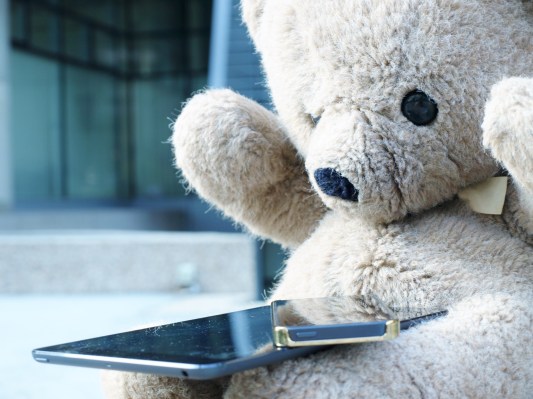In only a few months, the founders of IDerma, a medical technology start-up based out of Zagreb, Croatia, have developed and launched what they’re marketing as medical sensor technology for children. But unlike the sleek Scanadu Scout, this one takes the form of a teddy bear.
The product is called Teddy the Guardian, a plushie installed with sensors that measure heart rate, blood pressure, oxygen levels, and temperature, and then relay that data via Bluetooth to a parent’s phone. The sensors are scattered around the bear’s body; pressing a finger to the bear’s paw, for instance, takes heart rate and oxygen levels.
The idea behind disguising medical tech as a lovable toy is to provide parents and pediatricians more accurate, consistent data points. When a child is stressed out about going to the doctor, his or her vital signs will be skewed. Taking data points when the child is in a neutral emotional state can give doctors a wealth of good information to compare against when something is wrong.
Of course, the bear is just as much a tool for keeping parents attuned to their child’s general well-being as it is a medical device. IDerma co-founder Josipa Majić said that for busy parents who don’t have as much time to connect with their kids, the data can show when their child’s day has been particularly stressful or problematic.
Later versions of Teddy will be equipped with sensors specific to different medical conditions, Majić said. Blood sugar level measurements for diabetic children, for instance.
While the United States and Europe comprise Teddy the Guardian’s primary markets, China and India are also of interest. The increase in disposable income in rapidly developing countries has resulted in more money spent on a family’s first-born child, Majić said.
“We see the mommy community in the developing world as the quite the disrupters. They spend at least some time, up to 8 hours a day, on their cell phones and smartphones. 90 and even 91% [of their time] in China. In India, they believe tech makes them a better mom.”
Teddy the Guardian has already cleared its biggest hurdle: getting FDA approval on the medical technology. Although IDerma has its own sensors, Majić said they opted to outsource sensor development to another healthcare company, the name of which she declined to give.
The reason is simply because going through FDA and CE approval processes are expensive — too much so for a start-up. To get the green light, a company needs a very competent legal team, Majić said, which most cannot afford.
“These regulations are really start-up unfriendly. I would even say hostile,” she said.
It is difficult for U.S.-based start-ups to get approved by the FDA, she said, not to mention those from Central or Eastern Europe. In Europe, each country has its own legal specifications, which requires an even bigger legal team.
The company is currently bootstrapped, funded by IDerma’s past projects. Majić said they were considering either launching a crowdfunding campaign or applying to accelerators in London and Silicon Valley. They have, however, begun taking pre-orders and are talking with several multinational companies.
Outside of health trackers like Jawbone Up, Scanadu is the main competition in the world of medical tricorders for consumers, though Teddy the Guardian occupies a distinct space in its focus on pediatrics. Having FDA approval on the sensors is a leg up, meaning Teddy may be able to get out on the market before competing medical devices proliferate too much.
